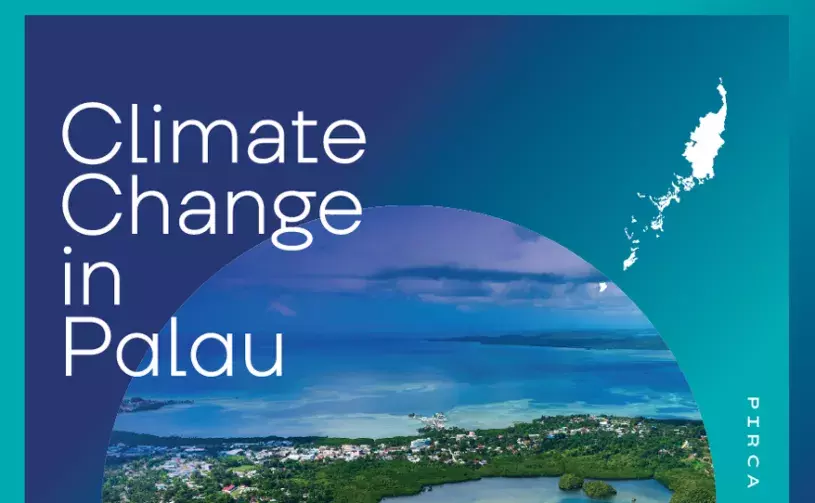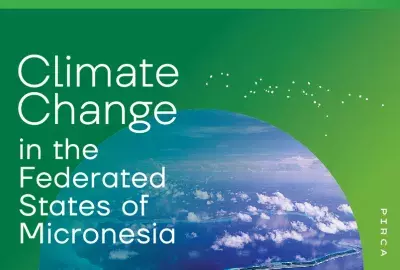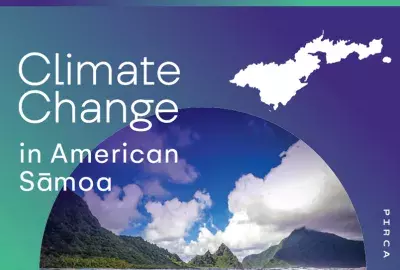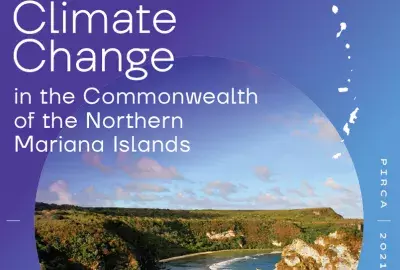Error message

Higher temperatures, stronger typhoons, coral reef loss, and coastal flooding are among the major challenges detailed in a new report on climate change in the Republic of Palau. Threatened resources include low-lying coastal infrastructure and the millions of dollars that ocean ecosystems add to Palau’s economy annually, according to the report by the Pacific Islands Regional Climate Assessment (PIRCA), a consortium of government, NGO, and research entities.
Climate Change in Palau: Indicators and Considerations for Key Sectors is one in a series of new PIRCA reports aimed at assessing the state of knowledge about climate change indicators, impacts, and adaptive capacity of the US-Affiliated Pacific Islands and the Hawaiian archipelago. Authors from the Republic of Palau’s Office of Climate Change, the Coral Reef Research Foundation, the Palau International Coral Reef Center, and the East-West Center—along with 30 technical contributors from government and nongovernmental organizations, research, and community groups—collaboratively developed the Palau PIRCA report. Key climate change issues affecting Palau include hotter conditions, stronger typhoons, threats to coastal infrastructure, and declining ocean ecosystem health. Climate change is expected to disrupt many aspects of life in Palau. Those who are already vulnerable—including children, the elderly, low-income families, and individuals with disabilities—are at greater risk from extreme weather and climate events.
Climate Change in Palau: Indicators and Considerations for Key Sectors provides guidance for decision-makers seeking to better understand the implications of climate variability and change for Palau and its communities. This assessment also identifies the additional information and research needed to support responses that enhance resilience and help Palau to withstand the changes to come.
The East-West Center PIRCA authors are affiliated with the Pacific RISA—a NOAA RISA team—and the Center’s Research Program.
Higher temperatures, stronger typhoons, coral reef loss, and coastal flooding are among the major challenges detailed in a new report on climate change in the Republic of Palau. Threatened resources include low-lying coastal infrastructure and the millions of dollars that ocean ecosystems add to Palau’s economy annually, according to the report by the Pacific Islands Regional Climate Assessment (PIRCA), a consortium of government, NGO, and research entities.
Climate Change in Palau: Indicators and Considerations for Key Sectors is one in a series of new PIRCA reports aimed at assessing the state of knowledge about climate change indicators, impacts, and adaptive capacity of the US-Affiliated Pacific Islands and the Hawaiian archipelago. Authors from the Republic of Palau’s Office of Climate Change, the Coral Reef Research Foundation, the Palau International Coral Reef Center, and the East-West Center—along with 30 technical contributors from government and nongovernmental organizations, research, and community groups—collaboratively developed the Palau PIRCA report. Key climate change issues affecting Palau include hotter conditions, stronger typhoons, threats to coastal infrastructure, and declining ocean ecosystem health. Climate change is expected to disrupt many aspects of life in Palau. Those who are already vulnerable—including children, the elderly, low-income families, and individuals with disabilities—are at greater risk from extreme weather and climate events.
Climate Change in Palau: Indicators and Considerations for Key Sectors provides guidance for decision-makers seeking to better understand the implications of climate variability and change for Palau and its communities. This assessment also identifies the additional information and research needed to support responses that enhance resilience and help Palau to withstand the changes to come.
The East-West Center PIRCA authors are affiliated with the Pacific RISA—a NOAA RISA team—and the Center’s Research Program.








